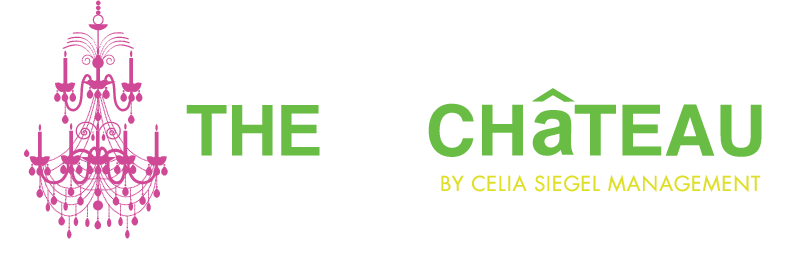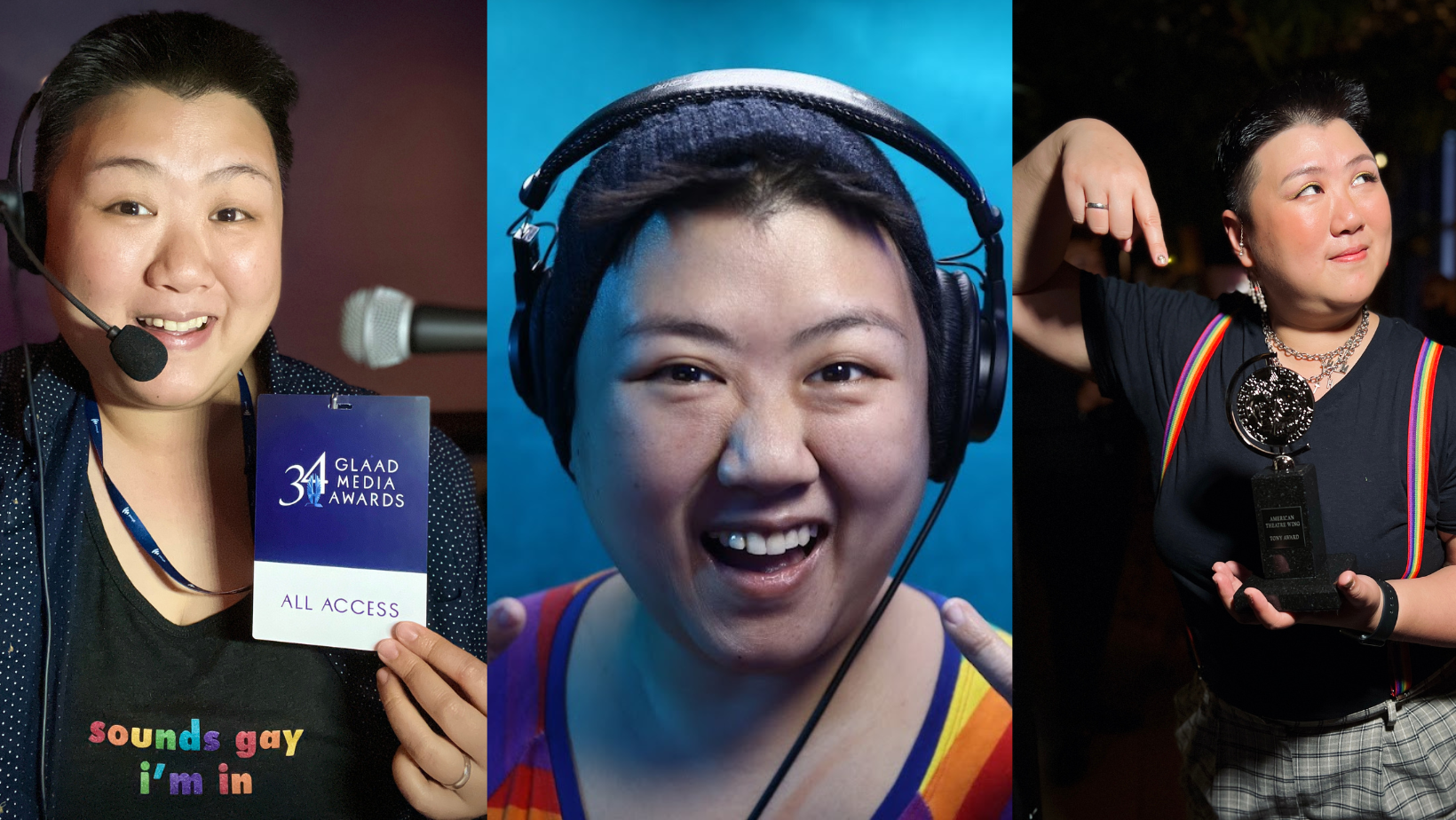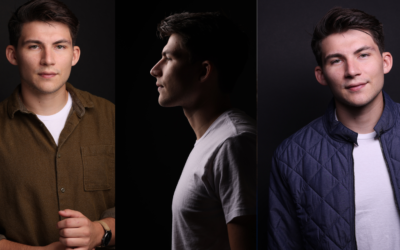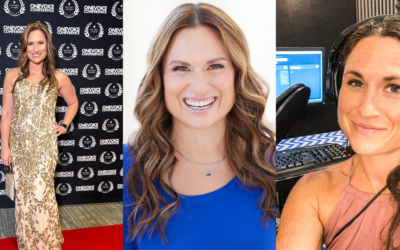Cherie B. Tay wants to check all your boxes and then break out of them completely.
Born in Texas, but raised in Singapore, Cherie has been all over the world. They returned to the States and moved around from Pennsylvania, back to Texas, to California, and eventually, their work as a stage manager brought them global — with stints in London, Paris, Italy, and Tokyo. They now reside in Brooklyn, and keep busy with well, a little bit of everything! Recently, Cherie made their onstage Broadway debut in “Melissa Etheridge: My Window.”
Cherie always had an interest in voice acting, but their work in theater kept them too busy to ever commit to it, although their voice could be heard letting audiences of thousands know that the show was about to begin. Enough people noticed Cherie’s gift, and said they needed to step into the voiceover world. Cherie took an intro course at Edge studio and bought some discount studio gear — then the pandemic hit. With live theater at a standstill and a brand new home studio, Cherie made their own demo and got their first agent, then it was off to the races.
Cherie discusses their multifaceted career, how identity shapes the work they do, and more in the following Q&A.
You’ve had a diverse career in the performing arts industry (multimedia artist, podcaster, professional photographer and videographer, ukulele teacher, among other pursuits). How has your background in the arts, including stage managing on Broadway, influenced your approach to voice acting?
I think for me (outside of the arts) and just as a human in general, I want to learn everything. In primary school, my friend was playing the flute in the band and I was playing guitar and I decided: “I want to learn the flute.” They said “you can’t be ‘Cherie of all trades,’” and I proved them wrong. So I guess I’m saying I’ve always been this way! I love taking on new skills and learning about people’s crafts. It’s a way to connect to people.
If someone’s talking about something I know, for example a photographer, I can say: “What do you shoot with? What lenses are your favorite? What do you edit in?”
Having those shared interests and knowledge allows for some great conversations. I think making that human connection is so important in this day and age, and it’s a bonus of truly having a desire to learn more, keep improving, and broadening my skill set. It’s fun and keeps me on my toes. If I find someone else who is just as eager about learning new stuff, it’s an instant bond. And of course, being a voice actor, you use all of it. That connection carries over — a commercial about music, great! A commercial about technology and camera equipment — perfect! Having so many different interests and spheres of influence is super helpful when it comes to conveying authenticity.
As a queer, AAPI / BIPOC, and gender non-conforming artist who grew up in Singapore, your perspective is unique and valuable. How does your identity influence the stories you choose to tell and the characters you portray?
One of my favorite things to say is that I like to check all the boxes and then break them.
I had an instance of a spec calling for an authentic Asian accent, and l auditioned with my Singaporean accent and booked the job. So I’m showcasing an authentic side of myself while also breaking their expectations of what they may have initially been envisioning. I grew up Southern Baptist, but culturally Chinese, which at times was isolating because of my struggle with realizing I was queer. So that piece of adding to representation is so important to me.
The amazing part of it is, so many commercials currently are going for a “white girl next door” sound — it’s kind of an unwritten spec. So, if I’m booking one of those, it feels extra special. It’s still authentically me, but they ended up hiring a queer Asian voice for a job that they maybe didn’t have one in mind for. I think that’s awesome.
In addition to those identity pieces that make up who I am, there’s also all my experiences that set me apart. I am a problem solver (and a recovering perfectionist). Being a Broadway stage manager, I’m always three steps ahead, thinking about how I can best complete the tasks at hand and help somebody else. I approach VO the same way — how can I best solve the problem while also bringing my true authentic side to the read? Also, having worked everywhere, I have a knack for languages and accents. I can pronounce words in Korean, Japanese, Chinese and Spanish — not fluent, but nailing pronunciations for foods, names and things like that has been a real asset.
With such a broad scope of work, is there a project that resonated with you or that you were most proud to be involved in?
I did the GLAAD Media Awards. That was awesome. I did an LGBT documentary for PBS as their narrator. I did a non-binary platypus animation. All of those projects felt freakin’ amazing to be a part of.
What future aspirations and goals do you have for your voice acting career, and what kind of projects or roles are you most excited to explore in the coming years?
For me, there’s always that one driving thing, or one goal that keeps pushing me. When I was doing theater, I was like, “I want to call Wicked one day.” My whole career for voiceover at the beginning was like, “I just want to be in an orange juice commercial that runs forever!”
Looking forward, ideally, I would do a lot more LGBTQ+ projects, and keep finding work that prioritizes uplifting minority voices. But on the other side of things, obviously a huge Commercial job wouldn’t hurt. Like I’ve been describing, a job doesn’t have to be specific to my identity to feel like I’m making an impact in that way.
In the end, it’s less about having worked so many jobs and more about a work life balance. Life is short and the world is unpredictable. Whatever I can do to make a living voicing things I believe in, to be able to live the life I want, and support the people who I love — that is the real end goal.
What is the most challenging part of working in this industry for you, and on the other hand, what is the most rewarding part of the work you do?
The hardest part is the valleys and the mountains. I think that’s the case for every artistic job out there, you can have the highest of highs, but in the low moments it can still be easy to think “Oh wow, I suck, I’m never going to work again.” The lack of consistency is difficult.
The best part about it is hard to pinpoint — it just brings me so much joy to do this work. I was such a quiet kid — like a silent, obedient child who never cursed or raised their voice. I have a very vivid memory of being in high school, having just moved back from Singapore, and I said a curse word at school. My teacher was shocked like, “did YOU just say that?” To go from that quiet child to now using my voice in such a huge way is so freeing, fun, and feels so joyful. I had to literally find my own voice. There’s no one moment that I can pinpoint that feeling, but it just keeps building and building until one day you’re standing on the top, you look down, and you realize, “Oh, wow! Look how far I’ve come.”
What is your favorite thing about working with CSM?
I love how responsive you guys are, and always so supportive and upfront about giving feedback. It definitely feels like I have someone behind me. It’s so helpful in terms of knowing that y’all have our backs. I also love the different learning opportunities and workshops you provide, getting to read for and be coached by some really talented people is amazing.
What’s in your booth: Things Cherie B. Tay can’t record without
- Chapstick! Essential.
- Grether’s Pastilles, Black Currant Flavor. Those are a current favorite of mine.
- My lights, I can change the color of all of my lights in my booth, which really helps to set the tone for whatever I’m reading.
- Nin Jiom herbal candies — soothing for the throat!
You can keep up with Cherie on Instagram and check out their demos here.





0 Comments